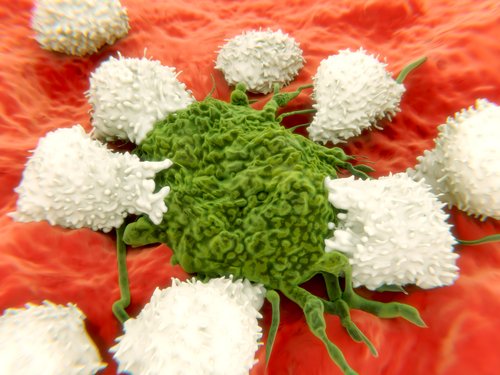Immune Cells That Produce a Certain Protein Could Be Used to Fight Liver Cancer, Study Reports

A subset of stem cell-derived immune cells, known as iPS-ML, stopped tumor progression and improved survival of mice with liver cancer, a Japanese study showed.
The findings suggest the cells could hold promise for treating the cancer.
The study, “Therapy of primary and metastatic liver cancer by human iPS cell-derived myeloid cells producing interferon-β,” was published in the Journal of Hepato-Biliary-Pancreatic Sciences.
Hepatocellular carcinoma (HCC), the most common subtype of liver cancer, is an aggressive disease commonly treated with radiation, chemotherapy, or a liver transplant. The treatments are often ineffective, however, so the prognosis for the disease is poor and the mortality rate high.
Researchers at Kumamoto University decided to see whether induced pluripotent stem cell-derived myelomonocytic cells, or iPS-MLs, could treat HCC and metastatic liver cancer.
What makes this subset of immune cells an important therapeutic tool is their ability to produce a protein called interferon-beta (INF-beta). The protein, which can activate the immune system and promote anti-tumor activity, has been used to treat melanoma, renal cancer, and some brain tumors. It requires several treatment sessions, however, and can generate toxicity.
Researchers gave mice an experimental treatment centered around INF-beta-producing cells. The mice received two to three abdominal injections per week for three weeks.
The team discovered that iPS-ML cells were able to infiltrate the liver of only those mice which had liver cancer lesions. Mice with liver tumors also had higher levels of IFN-β, they found.
The results suggested that the stem cell-derived immune cells were able to migrate toward the cancer site and penetrate damaged liver tissue. INF-beta levels were high enough and stable enough to inhibit tumor progression and promote cancer cell death, the researchers added.
“If it is determined to be safe for human use, this technology has the potential to slow cancer progression and increase survival rates. At this point, however, we still have much work ahead,” Satoru Senju, the senior author of the study, said in a press release.
Further studies are required to confirm the therapeutic ability of INF-beta and to see whether the treatment triggers adverse side effects in humans.







